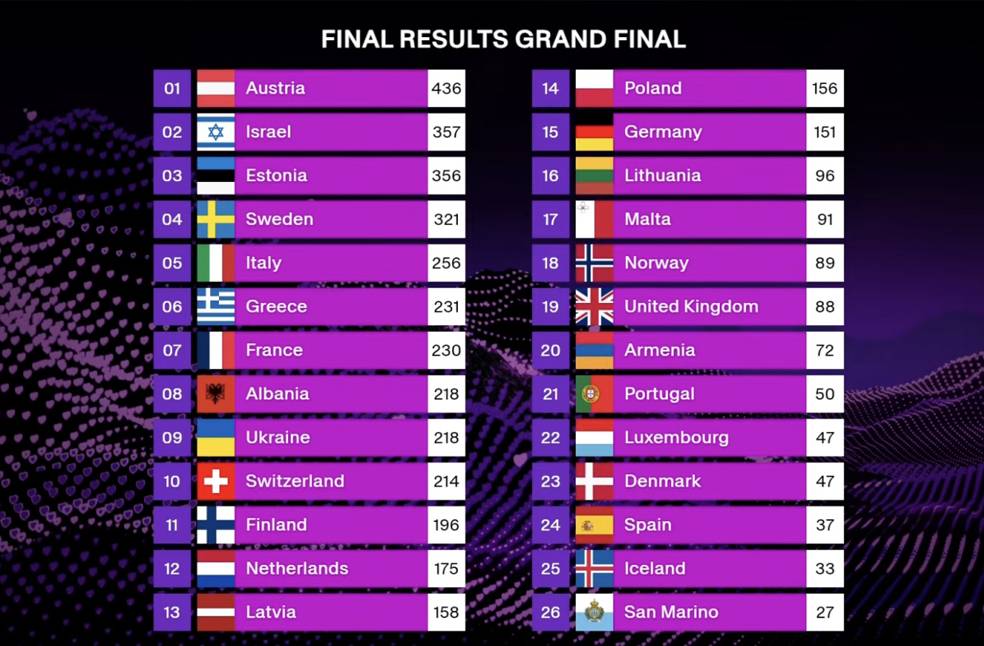Basel, Switzerland: Austria claimed victory at the Eurovision Song Contest 2025 with an emotional performance by Austrian-Filipino singer-songwriter JJ. The 24-year-old, born Johannes Pietsch and trained as a countertenor, captivated audiences with his operatic ballad Wasted Love.
Set on a dramatically storm-tossed ship, the performance depicted unrequited love and concluded with a techno breakdown. This marks Austria’s third Eurovision win, following Conchita Wurst’s 2014 triumph with Rise Like A Phoenix.
Israel secured second place with New Day Will Rise, a piano ballad sung in Hebrew, French, and English by Yuval Raphael, a survivor of the 7 October 2023 attacks. Her powerful message of resilience was briefly overshadowed by an incident during her grand final performance at the St Jakobshalle arena in Basel, Switzerland.
View this post on Instagram
Two pro-Palestinian activists attempted to breach the stage; one threw paint, hitting a crew member who was unharmed. The Swiss Broadcasting Corporation confirmed that the pair were stopped, handed over to the police, and later released. It remains up to the event organisers whether to pursue charges.
The politically charged atmosphere was further heightened when Spanish broadcaster RTVE displayed a message supporting Palestine at the beginning of the broadcast; “When human rights are at stake, silence is not an option. Peace and justice for Palestine.”
The European Broadcasting Union (EBU), which had previously warned RTVE over political statements, reiterated the need for neutrality during the contest.
Pro-Palestinian demonstrations were also held near central Basel, countered by a smaller group supporting Israel. Israel’s National Security Council had earlier advised its citizens in Basel to maintain a low profile. Unlike last year’s contest in Malmö, Sweden, flag restrictions were relaxed this year, allowing Palestinian symbols in the audience.
The UK’s entry, country-pop trio Remember Monday performed What The Hell Just Happened? in vibrant, Bridgerton-inspired costumes. They placed 19th, narrowly escaping the dreaded ‘nul points’ from juries but once again received no points in the public vote, repeating last year’s outcome.

The UK has won Eurovision five times, but recent results have been disappointing. Last year, Olly Alexander came 18th, and Mae Muller was second-to-last the year before. The only recent success came in 2022, when Sam Ryder finished second with Space Man.
Estonia’s Tommy Cash placed third with Espresso Macchiato, a provocative dance-pop entry that drew criticism in Italy for cultural stereotyping. Sweden, a fan favorite, came in fourth with the sauna-themed Bara Bada Bastu performed by KAJ. Ukraine, who won in 2023 and consistently ranks high since joining in 2003, finished ninth this year.
The grand finale, spanning four hours, was hosted by comedian Hazel Brugger, TV presenter Michelle Hunziker, and Eurovision veteran Sandra Studer. Returning fan favorites such as Croatia’s Baby Lasagna, Finland’s Käärijä, and last year’s winner Nemo performed during the event.
This year’s competition proceeded with far less internal disruption than in 2024, which saw the Netherlands disqualified after contestant Joost Klein allegedly made verbal threats, a charge he denied. In contrast, Dutch singer Claude represented the country this year with C’est La Vie, finishing 12th.
Next year, Eurovision’s 70th-anniversary edition will return to Austria, celebrating its latest win and closing a dramatic chapter in the competition’s history.



